Furniture's Role in Dubai's Real Estate Landscape
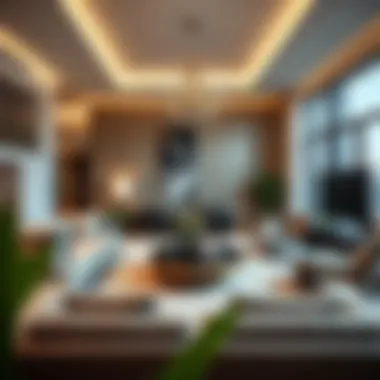
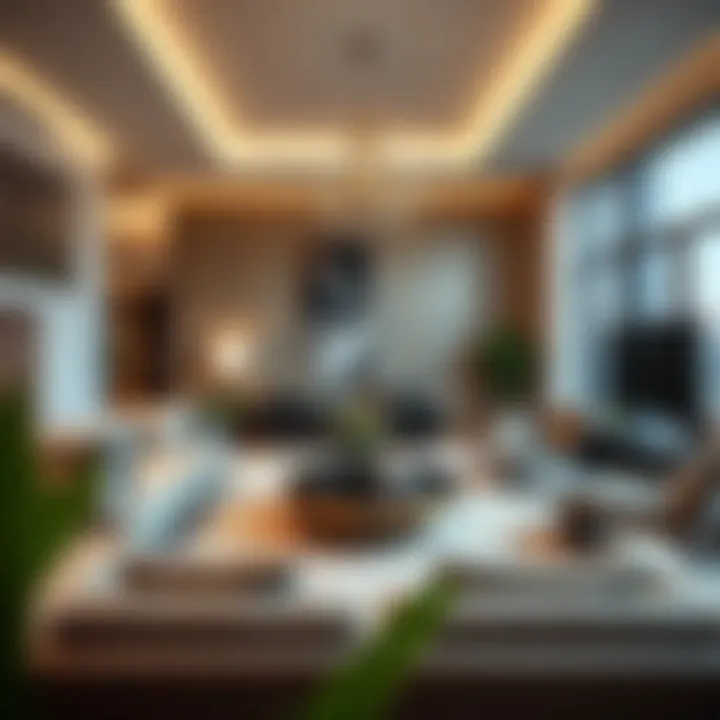
Intro
The bustling real estate market in Dubai stands as a unique intersection of luxury, diversity, and constant evolution. The selection of furniture plays a pivotal role in this vibrant landscape. For homebuyers, investors, and real estate professionals, understanding how tailored furniture choices can enhance both aesthetic appeal and functionality within properties is key. It's not just about filling a space but creating an environment that resonates with value and desirability. With the intricate relationship between interior design and real estate trends, discerning individuals can leverage this knowledge to navigate and capitalize on opportunities within the market.
In this article, we will explore the intricate dance taking place between furniture selection and the real estate market in Dubai. We will delve into market trends, sound investment strategies, and future predictions that highlight how one can effectively integrate furniture aesthetics into residential and commercial spaces. As we progress, we aim to arm homeowners and property enthusiasts with indispensable insights that can guide their decision-making process effectively.
The Significance of Furniture in Real Estate
When delving into the intricate world of real estate, one might not immediately recognize the profound role that furniture plays. However, that role is akin to the backbone of any space. It serves not just functional purposes but also encompasses a range of emotional and psychological influences that can make or break a property's appeal in Dubai's bustling market.
Furniture in real estate goes beyond mere decoration. It creates an atmosphere, evokes feelings, and even tells a story. Potential buyers or investors often step into a home filled with handcrafted pieces and designer items, and their initial impressions can set the tone for their entire experience. It’s like walking into a well-curated art gallery—the arrangement, style, and overall vibe can influence perceptions and buying decisions.
Understanding Buyer Psychology
Understanding the psychology behind buyer behavior is key for stakeholders in the real estate market. When buyers envision themselves in a property, furniture plays a pivotal role in helping them form an emotional connection. Think about it: a vacant room can feel cold and uninviting, whereas one dressed with vibrant colors, tasteful art, and cozy furnishings feels inviting and full of life.
Living in Dubai, where luxury is the name of the game, buyers are often drawn to properties that reflect their status and preferences. Sleek, modern furniture might appeal to a young professional, while a family might lean towards more classical and functional pieces. This varying taste signifies why understanding buyer psychology is paramount. Here are some points to consider:
- Emotional Connection: Buyers often base decisions on feelings. Furniture that resonates with their personal aesthetic can create that bond.
- Perceived Value: Well-selected furniture can elevate the perceived value of a property, making it feel more luxurious or tailored to a specific lifestyle.
- Liveable Space: Staging with the right furniture helps in demonstrating how a space can be utilized effectively, making it more relatable and practical for prospective buyers.
Furniture as an Investment Asset
In the realm of real estate, furniture can be more than just items to fill spaces; they represent investments in the overall worth of a property. Often underestimated, well-chosen pieces of furniture can enhance property value significantly. Imagine furnishing a spacious duplex with high-end Italian sofas or bespoke cabinetry—these types of investments not only improve aesthetics but also mark a sense of quality and exclusivity that appeals to discerning buyers.
A glance at the statistics reveals something fascinating: homes with professionally furnished interiors often sell faster and at a better price compared to those left bare. As a result, more sellers are now recognizing the importance of furniture in real estate deals.
- Return on Investment: Quality furniture holds value and may increase in worth over time, making it a desirable asset.
- Market Differentiation: In a saturated market like Dubai’s, having distinctive, quality furnishings can set a property apart from competitors.
- Tenant Attraction: For rental properties, well-furnished spaces often command higher rents and attract long-term tenants, ultimately ensuring a stable income stream.
In short, the significance of furniture in real estate transcends mere aesthetics; it is about creating impactful impressions and fostering connections that resonate deep within the buyer's psyche.
Market Trends in Dubai Furniture
In the bustling city of Dubai, where opulence meets innovation, the landscape of furniture has transformed dramatically in recent years. Understanding the market trends in Dubai furniture is essential for anyone involved in real estate—whether you’re a seasoned investor, a developer, or an expatriate looking to establish roots. The furniture options available aren’t just about aesthetics; they reflect deeper societal shifts, technological advancements, and an increasing awareness of sustainability.
Emerging Design Styles
As Dubai continues to evolve, so do the design preferences of its residents and stakeholders. One striking trend is the move towards minimalism. Homebuyers today often seek sleek, uncluttered spaces that reflect a sense of tranquility. This style emphasizes functionality and simplicity, allowing for personal touches without overwhelming the senses. Scandinavian design, known for its clean lines and natural materials, has been particularly well-received.
Apart from minimalism, there is a growing inclination towards fusion design, where traditional Arabic influences meld seamlessly with modern sensibilities. This could mean an intricately designed majliss chair alongside a contemporary table crafted from robust steel. Such combinations not only add character but also foster a unique narrative within a living space.
Another exciting trend is the use of bold colors and eclectic patterns. Contrary to minimalist aesthetics, this approach encourages homeowners to express their individuality through vibrant upholstery and striking art pieces. This style often transforms an entire room, creating a dynamic and engaging environment that reflects the owner's personality.
"In Dubai, furniture is more than just practicality; it’s an expression of identity."
Sustainability in Furniture Choices
As global awareness of environmental issues rises, the demand for sustainable furniture choices has taken root among the residents of Dubai. Homebuyers and investors are increasingly inclined to opt for products that not only look good but are crafted ethically. From reclaimed wood to sustainably sourced fabrics, the conscious consumer is making a mark.
Sustainability isn’t merely about the materials used; it also involves the design and production processes. Many companies are now prioritizing eco-friendly practices, ensuring that their furniture has a significantly reduced carbon footprint. This includes producing items that are designed for longevity, rather than those that contribute to a culture of disposability.
Moreover, the trend towards upcycling is gaining momentum. Consumers are drawn to unique pieces that tell a story, often revamping old furniture or choosing items that come with a history. This level of customization aligns with the desire for individuality in living spaces while contributing positively to the environment.
In summary, staying abreast of these trends isn’t just beneficial; it’s crucial for anyone looking to tap into the real estate market in Dubai. Not only does understanding these elements enhance property attractiveness, but it also aligns with modern values, making any investment far more appealing.
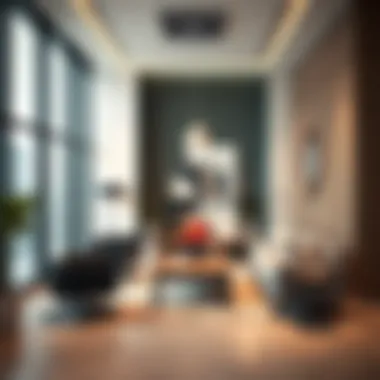

Types of Furniture for Residential Spaces
When diving into the world of residential spaces in Dubai, the type of furniture utilized does not just serve rectilineal purposes; it deeply intertwines with lifestyle, function, and aesthetic appeal. The right furniture selection can dramatically transform a property, making it more appealing to potential buyers or renters while also enhancing the experience of everyday living. Understanding the dynamics of this choice is crucial for anyone navigating the real estate landscape in Dubai.
Categorization by Functionality
Furniture can be broadly categorized based on its functionality, which plays a pivotal role in optimizing spaces. Recognizing how each piece aligns with daily life activities can help homeowners and investors design environments that feel both inviting and practical.
- Living Room Essentials: Sofas, chairs, and entertainment units are the cornerstones of a well-functioning living room. A well-chosen sectional sofa can serve multiple purposes, from seating guests to providing a cozy nook for family gatherings. The layout here is crucial; a sofa facing a focal point, such as a TV or a fireplace, shapes the overall feel of the space.
- Dining Spaces: The dining table is often central to family life, thus it deserves thoughtful consideration. A rectangular table may cater to larger groups, while a round table might foster more intimate gatherings. Choosing the right accompanying chairs is equally important; they should be comfortable for long meals but also fit seamlessly with the overall design.
- Bedroom Comfort: Here, the bed takes the starring role. Selecting the right mattress is vital to ensure good rest, but beyond that, bed frames, bedside tables, and wardrobes contribute to functionality and aesthetics. For example, a bed with built-in storage optimizes space in smaller apartments, a common scenario in Dubai.
- Workspace Furniture: The increase of remote work means more people are needing functional home offices. A quality desk, suitable chair, and organized shelving can make a world of difference. Ergonomics should guide choices here; a chair that supports the back can lead to improved productivity.
This categorization by functionality serves not just practical needs but also enhances the emotional connection people have with their homes. A functional space aligns more closely with lifestyle, which buyers often seek.
Aesthetic Considerations
While functionality is key, aesthetic appeal is what truly captivates. The design and style of furniture in residential spaces can strike a balance between personal expression and marketability.
A variety of factors come into play:
- Style Cohesion: Whether a homeowner prefers modern minimalism or classic elegance, the key is achieving a cohesive style. Mismatched furniture can lead to a cluttered visual experience, detracting from the overall appeal. For instance, pairing Scandinavian designs with lush, vibrant textiles can create a captivating space that tells a story.
- Color Palette: Colors evoke emotions and can set the mood of a space. Neutral tones like whites and beiges foster a calming atmosphere, while bold colors can energize a room. In Dubai, where aesthetics often mirror the bright, vibrant culture, adding splashes of color through cushions or artwork can create an inviting ambiance.
- Material Choices: Wood, metal, glass, and fabric selections can dramatically influence how spaces are perceived. Sustainable materials are on the rise, reflecting a growing appreciation for eco-friendly design—an important aspect for many buyers today. Choosing quality materials over cheaper alternatives can also speak volumes about a homeowner’s commitment to long-lasting design.
- Flexibility and Space Utilization: Consider furniture that can serve dual purposes, which is particularly important in smaller Dubai apartments. Foldable tables, extendable dining options, and modular sofas are excellent choices that maintain aesthetic integrity while enhancing functionality.
In a nutshell, aesthetic considerations combined with functionality create homes that do not just house but also resonate with emotions. The interplay between these elements contributes to the marketability of residential properties, attracting discerning buyers who seek harmonious living environments.
Key Insight: The right balance of functionality and aesthetic appeal can distinguish a property in the competitive Dubai real estate market.
For more insights on Dubai's furniture landscape, check out Wikipedia on interior design or explore discussions on furniture trends on Reddit.
Commercial Furniture Needs in Dubai
Dubai thrives on its economic growth and the influx of businesses, leading to a unique demand for commercial furniture. From striking office environments to inviting retail spaces, the choices made in furniture can both reflect a company’s brand identity and enhance functionality. In an international market like Dubai’s, where aesthetics and investment potential go hand in hand, selecting the right commercial furniture becomes imperative.
Office Space Requirements
When it comes to office spaces in Dubai, several factors come into play regarding furniture selection. First and foremost, the ergonomics of furniture is vital. Employees spend long hours at their desks, and investing in well-designed chairs and desks can lead to increased productivity and overall job satisfaction.
Moreover, flexibility is key in modern offices. Workspaces are evolving, often incorporating open floor plans or co-working setups. Furniture that can be easily reconfigured—like modular desks and movable partitions—allows businesses to adapt to their changing needs.
Considerations for aesthetic appeal are equally significant. A trendy office outfitted with sleek furniture from brands like IKEA or Herman Miller can attract top talent as well as impress clients. Bright colors and bold designs can energize work environments, while more subdued options may suit traditional firms. Choosing furniture that aligns with the company’s culture and mission can also play a meaningful part in reinforcing brand identity.
In terms of sustainability, companies are increasingly opting for green furniture made from recycled or eco-friendly materials. This not only reflects a commitment to sustainability but can also attract environmentally conscious clients and partners.
"Well-furnished offices are like a well-tuned orchestra; every piece plays its part for harmony and performance."
In a city that emphasizes luxury, high-end finishes and customized solutions are in high demand. Solutions such as built-in storage and technology-integrated desks can help reduce clutter and provide a seamless work experience.
Retail and Hospitality Furniture Trends
When examining furniture needs in retail and hospitality sectors, the focus shifts towards creating experiences rather than just providing products. Retail environments need to encourage foot traffic, and furniture plays a crucial role in this equation.
For retail spaces, layout and flow must be considered alongside aesthetics. Furniture must encourage customers to wander; think strategically placed seating areas or interactive displays that draw patrons deeper into the store. Companies often use furniture as a marketing tool, showcasing merchandise in a way that captures attention and encourages purchasing.
Hospitality furniture must combine comfort and style. In Dubai’s luxury hotels, lounge areas need to feel inviting and luxurious, often featuring bespoke pieces that catch the eye. Dining establishments also invest heavily in their furnishings, balancing practical needs like durability with an atmosphere that enhances the dining experience. Pieces crafted from high-quality materials are a common choice, ensuring a lasting impression on guests.
Additionally, the advent of technology is making its way into furniture for the hospitality industry. Think charging stations built into tables or smart furniture that can adjust according to the needs of guests, thereby enhancing their experience.
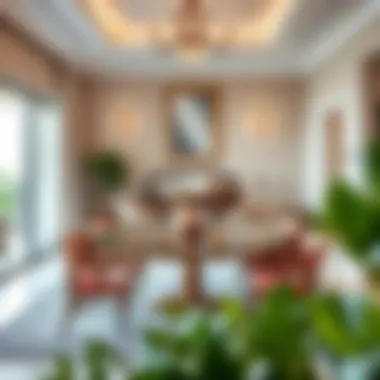
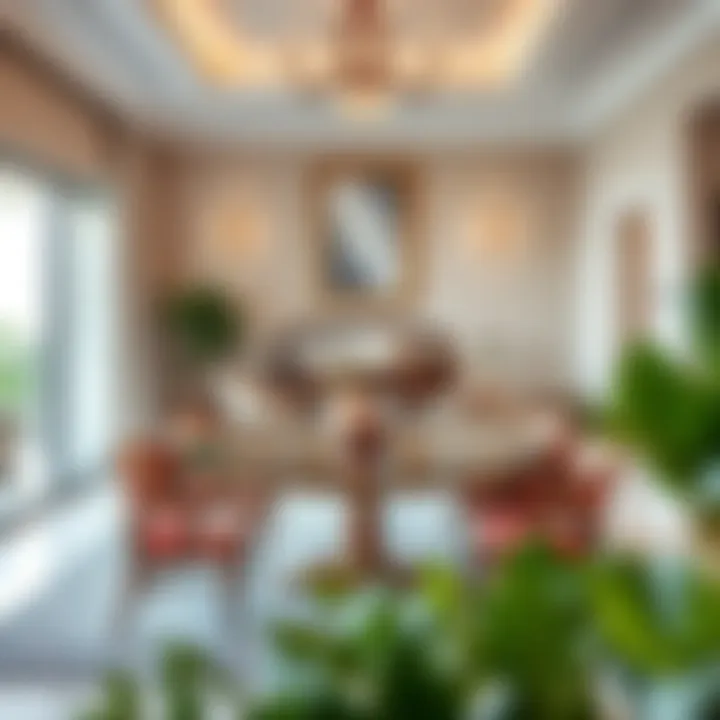
In summary, both office and retail/hospitality sectors share common goals in their furniture selection—functionality, aesthetics, and adaptability. This reflects a broader trend in Dubai, where businesses strive to create environments that not only meet basic needs but elevate the entire experience for employees, consumers, and clients alike.
Navigating the Local Furniture Market
Navigating the local furniture market in Dubai is akin to exploring a vibrant bazaar full of options, styles, and prices. This section aims to shed light on the myriad aspects that an aspiring homebuyer or investor must consider when diving into the bustling furniture scene of this metropolitan jewel. Furniture choices aren’t just about aesthetics; they are about investment, comfort, and even cultural expression. Choosing the right pieces can significantly enhance the livability of a space and, in effect, its market value.
Key Retailers and Showrooms
When one thinks about where to find furniture in Dubai, a plethora of options spring to mind. From sprawling showrooms like IKEA, known for its practical designs, to luxury retailers like THE One, offering an array of unique, bespoke pieces, the city caters to varied tastes and budgets.
Many showrooms in Dubai are hubs for innovative design. Danube Home stands out as a brand that marries style with affordability, often running promotions that make high-quality furniture accessible. Then there's Home Centre, which combines a range of both modern and traditional styles, perfect for those looking to add a local flair to their decor.
It's vital to explore some lesser-known local workshops as well; they offer customized furniture solutions that truly reflect individual style. Visiting these places can also yield some hidden gems, so don’t shy away from smaller shops tucked away in busy neighborhoods like Al Quoz or Jumeirah.
In Dubai, physical visits to stores can be an experience in itself. Many showrooms are designed like galleries, allowing potential buyers to envision how their future homes might look. It’s advisable to spend time asking questions, trying out pieces, and discussing styles that resonate with your needs.
Understanding Pricing Structures
Navigating the pricing structures in Dubai's furniture market requires a fine balance of knowledge and indepth research. Prices can vary widely based on a variety of factors including materials, brand reputation, and even location of the store. High-end luxury items typically come with hefty price tags, while the mid-range options are often just as stylish but surprisingly affordable.
- Material Types: Solid wood and high-grade leathers tend to elevate prices significantly compared to laminated particle board or synthetic fabrics.
- Brand Influence: Renowned names like Roche Bobois or Cassina might command prices that could make one’s eyes water, but often, they offer unique design and lasting quality.
When trying to determine where to allocate your budget, consider creating a list of essentials versus decorative items. Not all items need to be top-tier; sometimes, a well-placed, thoughtfully chosen piece of decor from a local market can add the spark needed.
Additionally, be aware of seasonal discounts and sales festivals that are common in Dubai, like the Dubai Shopping Festival, where prices can drop significantly. Established retailers often offer loyalty programs that can result in future savings.
Considerable thought should go into budgeting for transportation and assembly as well; some retailers include these services, while others may charge extra.
Customization and Bespoke Furniture Solutions
In the ever-evolving landscape of Dubai's real estate market, the significance of customization and bespoke furniture solutions cannot be overstated. Buyers and investors alike are looking for unique spaces that reflect their personal style, needs, and narratives. Here, customization serves not just as a luxury option but rather a necessity that helps potential homeowners and property developers maximize their investments.
Custom furniture opens the doors to endless possibilities. It provides a way for individuals to express their personality through their environment. In a city that boasts luxury and opulence, homes filled with generic, mass-produced furniture can feel out of place. Thus, crafting pieces that echo the essence of a homeowner's lifestyle can dramatically elevate the overall appeal of a property. From tailored cabinets to unique dining table configurations, bespoke items make a house feel like a home.
Benefits of Customization
The advantages of incorporating customized or bespoke furniture into a property are manifold:
- Personalization: Tailored solutions ensure that furniture resonates with the homeowner's aesthetic preferences. It can be a direct reflection of their vision, offering them a stake in the property's design.
- Optimal Use of Space: Every apartment or villa in Dubai comes with its quirks, whether it's an awkward corner or underutilized areas. Customized furniture can be designed to fit these dimensions perfectly, making the most out of available space.
- Quality Over Quantity: Customized pieces often employ higher-grade materials than their mass-produced counterparts. This means not just aesthetic appeal but also longevity, enhancing the property’s overall value.
- Unique Selling Point: When it comes time to sell, properties boasting bespoke furniture have a silver lining. The uniqueness can attract discerning buyers willing to pay a premium for one-of-a-kind designs.
Finding the Right Craftsman
Acquiring custom furniture isn't merely about selecting designs; it demands skilled craftsmanship to bring those visions to life. Finding the right craftsman is vital for ensuring that the customized pieces align with the specified requirements.
A few tips to consider:
- Research Local Artisans: Dubai is home to a plethora of talented craftsmen ranging from traditional woodworkers to modern designers. Platforms such as Instagram, LinkedIn, and even local forums can be invaluable for discovering artisans who specialize in bespoke furniture.
- Check Portfolios: Reviewing previous works helps in gauging the quality of craftsmanship, as well as the style versatility of a craftsman. Websites like Behance and Pinterest can act as inspirations.
- Understand Your Materials: A craftsman’s knowledge about the different types of materials can significantly impact the outcome. Engaging someone who understands local resources can also contribute to sustainable practices in the creation process.
- Engage in Dialogue: Communication is key. Discussing designs in detail ensures that both the homeowner’s vision and the artisan’s expertise align harmoniously.
With the right approach, the journey for customized furniture becomes a collaborative expression of an individual’s vision, turning a mere living space into a sanctuary that marries functionality with art.
"Investing in customized furniture is about more than aesthetics; it’s a profound expression of identity within an investment property."
The Influence of Technology on Furniture
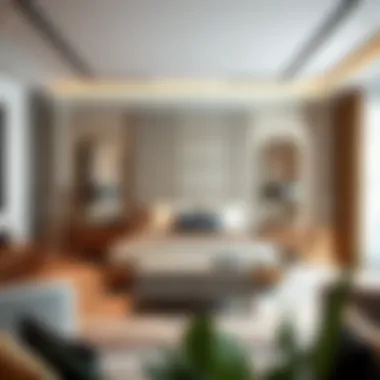
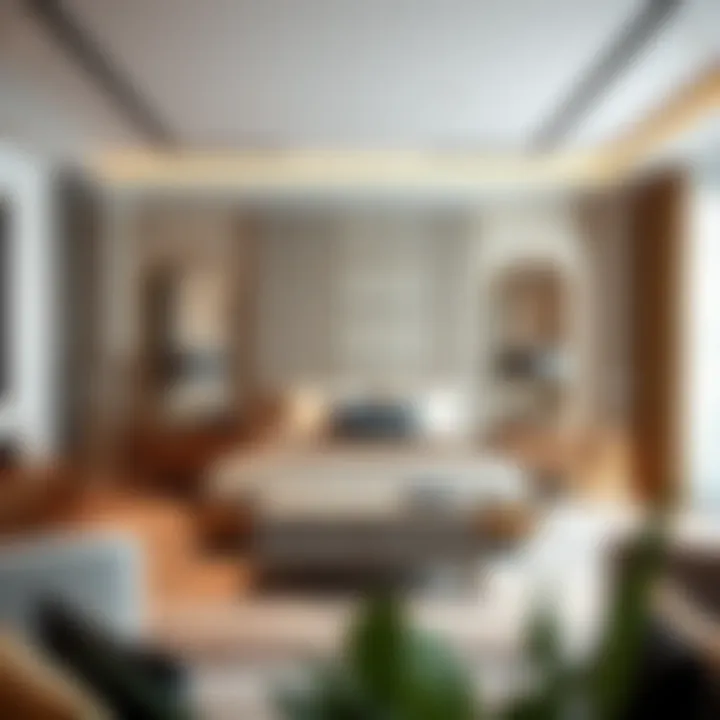
The realm of furniture is undergoing significant transformation, influenced heavily by rapid advancements in technology. The integration of modern technology within furniture design and selection not only enhances functionality but also elevates the overall living experience. For prospective buyers and investors in Dubai's dynamic real estate market, understanding this influence is of paramount importance. As homes become smarter and more intuitive, the demand for tech-savvy furniture solutions escalates, making it essential for stakeholders to keep their fingers on the pulse of these trends.
Smart Furniture Trends
The rise of smart furniture represents a symbiotic blend of technology and design. This innovative category encapsulates everything from intelligent seating that adjusts to your body posture to * desks with built-in wireless charging*. The potential benefits of incorporating smart furniture into Dubai's homes are immense. Here are a few standout trends:
- Multi-functionality: In a city known for its luxury, space is often at a premium, especially in high-rise apartments. Multi-functional furniture, like foldable dining tables and convertible sofas, makes efficient use of space.
- User Control: Furniture that integrates with smartphones enables users to control their environment from a distance. Imagine adjusting lighting and temperature settings through an app, enhancing comfort while promoting energy efficiency.
- Health and Wellness: With increasing awareness around wellness, products that encourage better posture or provide massage capabilities are being pursued. Items like ergonomic chairs and beds with adjustable firmness levels are gaining traction.
The evolution of smart furniture aligns with the affluent Dubai lifestyle, where technology elevates both convenience and luxury. But while the advantages are enticing, considerations must be made regarding the costs, installation processes, and potential disruptions during the transition.
Virtual Reality in Furniture Shopping
Virtual reality (VR) introduces a groundbreaking dimension to the furniture shopping experience, revolutionizing how buyers explore their options. This technology allows potential buyers to immerse themselves in virtual environments, making the selection process not just practical but also engaging. With VR, consumers can visualize how furniture pieces fit within their homes before making a purchase, leading to more informed decisions.
Through VR, furniture retailers can showcase products in a more interactive manner. Consider these attributes:
- Enhanced Visualization: By experiencing how various pieces look and fit in their space, clients can avoid the common pitfalls of mismatching dimensions or styles.
- Experimenting with Layouts: VR allows users to play around with room layouts, from cozy nooks to spacious entertaining areas, enabling personalized design at their fingertips.
- Reduced Uncertainty: Addressing buyer hesitation becomes easier when clients can tour a simulated space that reflects their preferences. This is especially significant in a multi-faceted market like Dubai, where diverse tastes clash.
As technology reshapes the furniture landscape, these advancements contribute to a more considerate approach to design—one where aesthetics, functionality, and technology meld seamlessly to accommodate modern lifestyles.
Staging Properties with Furniture
Staging properties with furniture plays a crucial role in showcasing a home’s potential, elevating its aesthetic appeal and helping buyers visualize their lives in the space. In a bustling market like Dubai's, where competition is fierce and the choices plentiful, properly staged homes become more attractive than their counterparts. By employing strategic furniture choices, sellers can craft inviting atmospheres that resonate with potential buyers or tenants.
The central aim of staging is to highlight a property's strengths while downplaying its weaknesses. Skillful staging involves several elements that work together harmoniously. Furniture arrangement, color schemes, and decor selections must be executed with precision, creating layouts that make rooms appear spacious and functional. This not only aids in expressing warmth and comfort but also aligns with the lifestyle aspirations of the target audience.
Effective Staging Techniques
To effectively harness the power of staging, one must apply a handful of proven techniques.
- Decluttering: Before even thinking about furniture placement, an organized space is key. Remove unnecessary items to open up the area and emphasize key features of the property.
- Neutral Colors: Opt for neutral tones to create a blank canvas. This makes it easier for buyers to imagine personal furniture and decor.
- Opt for Scale: Select furniture that is proportional to room size. Oversized pieces can dwarf small spaces, whereas dainty items in a large room can feel lost.
- Layering Textures: Incorporate textiles like pillows, rugs, and throws to evoke a homely feel. Different textures add depth and interest, transforming a mere room into an experience.
- Strategic Lighting: Effective use of lighting can change the entire ambiance. Use natural light, along with warm artificial sources, to cultivate a welcoming environment.
Moreover, one unique technique that has been gaining traction is the use of digital staging tools. Virtual staging allows potential buyers to restyle and visualize rooms through a digital platform. This can save time and money while ensuring a property stands out in listings.
Impact on Marketability
The impact of well-executed staging on a property's marketability often becomes clear almost immediately. A staged home can significantly attract more visitors during open houses and viewings. When buyers step into a well-furnished and decorated space, it can elicit an emotional response, making them more likely to picture themselves living there.
A study by the National Association of Realtors revealed that staged homes sell 73% faster than unstaged properties. This is particularly vital in a dynamic market like Dubai, where every day can bring new listings that vie for attention.
Ultimately, staging also provides a competitive edge, allowing properties to command higher offers. "First impressions matter, and staging ensures that the first impression is a lasting one. Selling isn’t just about brick and mortar; it’s about experiences and emotions," notes Jonathan Smith, a local real estate agent.
In closing, the art of staging is a strategic opportunity that enhances the overall marketability of properties. When done right, it becomes a powerful tool that not only increases the likelihood of selling but can also affect the selling price, highlighting its immense significance in Dubai's thriving real estate landscape.
End
The focal point of this article rests on the vital role of furniture within Dubai's real estate market, an aspect often overshadowed by more structural considerations. As the conversation about property investment continues to flourish, understanding furniture's impact on both aesthetics and functionality becomes crucial for homebuyers, investors, and property developers alike.
The Future of Furniture in Dubai Real Estate
The horizon for furniture in Dubai’s property sector appears brighter than ever. Anticipated trends indicate a shift towards multifunctional designs. With the increasing number of smaller apartments, homeowners and developers alike are keen on compact yet stylish solutions. The functionality of pieces that offer storage, comfort, and style is key to attracting discerning buyers in this bustling market.
- Technology Integration: The integration of smart technology in furniture is expected to rise. Homes equipped with automated systems, like voice-activated lighting and smart appliances, demand furniture that complements these features.
- Sustainability: As environmental concerns become more prominent, the shift towards sustainable materials is set to dictate future trends. Buyers are more likely to favor reclaimed wood and recycled materials that tell a story.
- Local Artisanship: The resurgence of bespoke furniture crafted by local artisans showcases Dubai’s rich cultural tapestry. This trend not only supports local talent but also adds uniqueness to spaces, making properties more appealing to potential buyers.
Final Thoughts on Integration of Furniture Choices
Incorporating the right furniture choices is no longer just about style but rather a strategic move in enhancing property value. By understanding the subtleties of buyer preferences in Dubai, sellers can tailor their offerings accordingly. A well-furnished property not only stands out in listings but also resonates with the emotional aspects of home buying.
- Buyer Appeal: Well-thought-out furniture arrangements can make spaces feel larger and more inviting. A staged living area can be the tipping point that turns curiosity into a signed contract.
- Investment Consideration: From a financial standpoint, investing in quality furniture can yield a high return on investment. Properties that showcase thoughtful furniture and design are likely to attract higher bids during sales.
Ultimately, the essence of furniture within the landscape of Dubai's real estate market is profound. Investing in suitable furniture enriches the living experience while maximizing property appeal and marketability. Keeping abreast of the evolving trends will ensure that stakeholders across the real estate spectrum make informed decisions that precisely meet the demands of the contemporary buyer.

